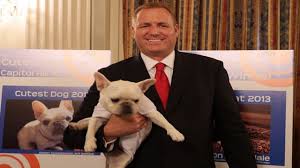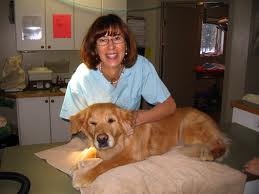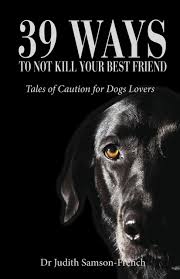Veterinary Community Doesn't Take 20/20 Report Lying Down
Dr. Marty Becker, America's Veterinarian
 When Animal Radio® Veterinary Correspondent Dr. Marty Becker was featured in the prime-time show on dishonest veterinarians, he had no idea they would translate meaning in the editing room. After many vets spoke angrily about the 20/20 report, Dr. Becker resigned from ABC, ending 17 years of dedicated service on Good Morning America, in which Dr. Becker was never a paid employee of ABC and was never paid a penny. Hear what happened and what was supposed to happen in this exclusive conversation.
When Animal Radio® Veterinary Correspondent Dr. Marty Becker was featured in the prime-time show on dishonest veterinarians, he had no idea they would translate meaning in the editing room. After many vets spoke angrily about the 20/20 report, Dr. Becker resigned from ABC, ending 17 years of dedicated service on Good Morning America, in which Dr. Becker was never a paid employee of ABC and was never paid a penny. Hear what happened and what was supposed to happen in this exclusive conversation.
The 20/20 report that recently aired on ABC has the veterinary community sounding off. The report, "Is Your Veterinarian Being Honest with You?" featuring former Canadian Veterinarian Andrew Jones, who alleged that some veterinarians pad visits with what he claims are unnecessary services and treatments, such as an annual teeth cleaning, saying dentistry is the ultimate veterinary "upsell."
Dr. Becker was of the understanding that the segment was going to be a positive piece on veterinary medicine. He felt it was going to include new changes in vaccine protocol; new testing for periodontal disease; and things of that nature. Imagine his surprise when he watched the show and saw that it was a kind of "Gotcha" segment.
Dr. Becker's initial purpose was to discuss saving money on veterinary care without shortchanging your pet, as well as how to chose a veterinarian. However, Dr. Becker did know they were going to do an undercover piece, where a dog was taken to different veterinarian offices to see what was wrong with the dog, if anything.
 When he originally did the interview, Dr. Becker didn't know what the title of the show was going to be, or that there would be other segments included, such as bartenders that shortchange you on drinks. He was asked about vaccines and a hypothetical question about a young dog recently examined by a veterinarian that appeared to be healthy, "Would a healthy young dog need to have his teeth cleaned under anesthesia?" He answered, "Only if it's necessary."
When he originally did the interview, Dr. Becker didn't know what the title of the show was going to be, or that there would be other segments included, such as bartenders that shortchange you on drinks. He was asked about vaccines and a hypothetical question about a young dog recently examined by a veterinarian that appeared to be healthy, "Would a healthy young dog need to have his teeth cleaned under anesthesia?" He answered, "Only if it's necessary."
The producers then took his answers out of context and edited his answers directly into a place where he seemed to back up the allegation that the dog really didn't need dental care.
When Dr. Becker thinks of a young dog, he thinks of one that is up to the age of two, not a four-year-old dog such as this one. Eighty percent of the pets by the age of three have periodontal disease, but Dr. Becker doesn't know how much that percentage goes up by age four. If he had known the true age of this dog, or actually saw the dog in this case, he would have been able to show that that he did have tartar on his teeth as well as an oral growth in his mouth, which you could obviously see from the film.
Dr. Becker went from thinking it was going to be great piece to talk about great things in veterinary medicine, to his horror in seeing how veterinarians were portrayed! In humans, we celebrate preventive care and love it when people actually brush their teeth and get them cleaned in a regular basis. They actually made it seem that there was something wrong with preventive care in veterinary medicine, when that is what you have to do.
Dr. Becker still doesn't understand why they would speak with Canadian Veterinarian Andrew Jones who lost his license and has a product to sell. Dr. Becker feels the only good thing to come out of the show was, after his initial shock and horror, was that it has heightened up the discussion of preventative care. It has given him a chance to talk about things in his own words – not edited!
Remember, your veterinarian looks at your pet with their best interest in mind. They use their experience and training. They can be accused of missing a diagnosis, be late for an appointment, or even charging too much, but they're not going to be accused of not looking after the pet's best interest!
You may find that prices fluctuate for the same procedures around the country, but are relative to where you live. For example, a dental cleaning in New York may costs higher than a dental cleaning in Northern Idaho. It is also like comparing apples to apples. When some veterinarians do a surgery, they will do pain medication before, during and after the surgery, they may have a nurse anesthetist, they may be using the latest generation of gas anesthesia, while some veterinarians don't. When you call around for prices for example on spays, neuters and dental cleanings, you are probably not going to exactly the same thing at all places.
While Dr. Becker has taken a beating on this segment, he is not concerned about himself. What he is worried about is the number of pets that aren't going to get adequate care because people might question it. He feels there is going to be a lasting affect of that, which is his biggest regret and that is why he left ABC.
There are things you can do at home to help prevent periodontal disease in your pets. You can brush their teeth daily; floss their teeth a few times a year; put a dental sealant on their teeth weekly; and give them an edible toothbrush. At the very least, do some kind of daily oral care and your pet is going to live 15% longer, which is average of two years.
Read more about Becker's thoughts on the 20/20 report and interview.
Dr. Becker has been practicing veterinary medicine for more than 30 years and is a best-selling author, syndicated columnist and a frequent guest on national shows. You can also find Dr. Becker on Vetstreet.com, a new animal health and lifestyle website dedicated to giving pet owners the most accurate information possible to keep their pets healthy and happy. Follow Dr. Becker on Facebook and Twitter.
http://www.vetstreet.com
Trains, Planes and Chihuahuas
Jeff Denham (R-Calif), Pets On Trains Act
 Our guest, Congressman Jeff Denham (R-California) has introduced the Pets on Trains act to allow crated pets on Amtrak trips of less than 750 miles for a fee. The lawmakers say they envision a car designated for pet travel. Convincing the government subsidized Amtrak to be competitive with the already accepting airlines may not be that easy. Amtrak banned pets in the 70's.
Our guest, Congressman Jeff Denham (R-California) has introduced the Pets on Trains act to allow crated pets on Amtrak trips of less than 750 miles for a fee. The lawmakers say they envision a car designated for pet travel. Convincing the government subsidized Amtrak to be competitive with the already accepting airlines may not be that easy. Amtrak banned pets in the 70's.
Many people live in areas where their primary mode of transportation is the train, and Denham eels that they should be able to ride on the train with their animals. Currently, you can take a service dog on the trains. But for the other people with pets, this means they either have to travel by car or by air travel. Air travel can be very limiting for people with large dogs. They would have to ride as cargo and then can only travel at certain times of the year depending upon the weather.
Denham wants Amtrak to bring back their original policy of having animals travel on all trains, and they can even use it as a revenue producer. It was suggested that they could even have a special "pet" car for those travelers. The bill is a bipartisan bill and is getting a lot of support on Capitol Hill.
 There may be certain limits and restrictions with regard to pets, but that is being left up to the flexibility of Amtrak.
There may be certain limits and restrictions with regard to pets, but that is being left up to the flexibility of Amtrak.
Initially, Amtrak was resistant to changing their no pets policy, but they are now open to having the discussion and to see the revenue opportunities. Amtrak is partially government subsidized and the government should have some say so on what their criteria consists of.
How can you help make this change? Email Richard De Sousa, Senior Officer and Marketing International Sales For Amtrak and let him know how you feel. Maybe you don't take the train currently, but would start taking trains if you could bring your pet along.
View a copy of the Bill.
Well-Meaning Owners Who Have Killed (or Narrowly Killed) Their Pets
Judith Samson-French, 39 Ways To Not Kill Your Best Friend
 With case files from her own practice, Seasoned Veterinary Surgeon Dr. Judith Samson-French determined how we can avoid accidentally killing our pets. Even with our best intentions, we may be putting our furry-friends in harms way. She'll reveal some of the stranger ways good owners unexpectedly killed their pet in her new book, 39 Ways To Not Kill Your Best Friend.
With case files from her own practice, Seasoned Veterinary Surgeon Dr. Judith Samson-French determined how we can avoid accidentally killing our pets. Even with our best intentions, we may be putting our furry-friends in harms way. She'll reveal some of the stranger ways good owners unexpectedly killed their pet in her new book, 39 Ways To Not Kill Your Best Friend.
From choke collars and heatstroke to puppy mills and greyhound racing, she tackles polarizing issues head on, compassionate but unflinching as she reinforces the do's and don'ts of responsible canine care.
You will be a better dog owner by looking at some of the ways other people have brought their dogs to an untimely death. This includes what we feed our dogs (the recent salmonella outbreak in dog food) to purchasing puppy mill dogs.
When acquiring a new puppy, if you do not see the mother, the father or the littermates, you should not get this puppy. You need to see the environment in which the puppy was raised with its siblings. If you do not see this, it is almost guaranteed that you will make your veterinarian very, very, wealthy. Dr. Samson-French has even seen puppies showing severe signs of his dysplasia at the age of six months. These dogs may appear healthy for the first few months, but after that, the may start to show multiple signs of health problems.
 But even if you already have that puppy, you need to not only be cautious at this time of year with the holiday decorations, but all year round. Dogs have even eaten poker chips, because the people who were handling them had greasy hands from eating snacks. Even our own Dr. Debbie has seen a dog suffocate in a potato chip bag.
But even if you already have that puppy, you need to not only be cautious at this time of year with the holiday decorations, but all year round. Dogs have even eaten poker chips, because the people who were handling them had greasy hands from eating snacks. Even our own Dr. Debbie has seen a dog suffocate in a potato chip bag.
Dr. Samson-French tells us the most bizarre near death story in her book was a dog named Marshall. How owner tried to do good, but actually did very bad. Marshall was a Golden Retriever riding in an open Jeep. The owner did attach a leash to Marshall so he couldn't jump out. Unfortunately Marshall did jump out, but the leash was too long. It would have been better if Marshall wasn't attached at all. This would have allowed him to fall free of the vehicle. But instead, the leash caused him to remain attached, and was long enough for him to get caught in the wheel well. You will have to read the book to see what eventually happened to Marshall.
This is a reality check that no serious dog owner can afford to miss: what you learn here could save your pet's life. "A Dog With No Name" will be fed for three days with the purchase of this book. Help to "Give a Dog a Life."
http://www.dogswithnonames.com
Eco-Friendly Benefits of Using Natural Cat Litter
Swheat Scoop Minute With Doc Halligan
 According to the ASPCA, a single domestic cat goes through as much as 280 pounds of litter a year - litter that has to be disposed of somewhere. Many pet parents are coping with this concerning issue by choosing a natural, biodegradable litter. Today's earth-friendly litters leave a smaller carbon paw print than conventional brands without sacrificing deodorizing or clumping performance. For more ways to reduce your kitty litter waste, just remember to Reduce, Reuse and Recycle.
According to the ASPCA, a single domestic cat goes through as much as 280 pounds of litter a year - litter that has to be disposed of somewhere. Many pet parents are coping with this concerning issue by choosing a natural, biodegradable litter. Today's earth-friendly litters leave a smaller carbon paw print than conventional brands without sacrificing deodorizing or clumping performance. For more ways to reduce your kitty litter waste, just remember to Reduce, Reuse and Recycle.
Reduce - The simplest way to cut down on kitty litter waste is by choosing a formula that lasts longer between litter box changes. Many alternative litters last two or three times longer than the leading brands.
 Reuse - Look for litters made from renewable, sustainable resources such as wood or plants.
Reuse - Look for litters made from renewable, sustainable resources such as wood or plants.
Recycle - Unlike conventional clay litters that never decompose or dissolve away, an eco-conscious, natural litter can be returned safely to the earth. After thorough scooping, you can even add it to your compost pile for use around trees, flowers and shrubs (litter compost should never be used in vegetable gardens).

Brought to you by Swheat Scoop. Click for $3.00 off Coupon
 The Dogfather's Grooming Tip with Joey Villani
The Dogfather's Grooming Tip with Joey Villani
Re-Grow Hair On Your Dog's Ears In Cold Weather
During the cold weather, your dog may experience hair loss on his ears. In most cases, it is a problem with circulation. The skin will stay cold, and when the skin is cold, it will not let the hair grow at the rate that it should. It can even stunt the hair growth completely.
The solution is to warm up the skin on their ears. But how do you do that? It's real easy! Coat the ear in a thin layer of Vaseline. The Vaseline will actually hold the heat into the ear. You will then get a significant amount of hair growth in a short amount of time.
Joey didn't think this would actually work, but when he tried it on a dog in his salon, he saw a significant difference in 3 weeks. Eventually, the dog was able to completely regrow the hair back on the ears, which was then able to sustain itself, without further treatment.
Animal Radio® News with Stacey Cohen
 Cows Crash Through Roof
Cows Crash Through Roof
A British artist is still in shock after cows crashed through her roof. According to the BBC, Sue Marshall was vacuuming when she heard a "terrific crash." Thinking a tree had fallen on her house, Sue went outside and saw a huge hole in her roof. Inside her home was a cow that had fallen through a skylight. After going inside to help the cow, another fell through the gaping hole. Apparently, the animals had broken through a fence in a field that overlooks her home. Marshall says the fact she wasn't injured is nothing short of miraculous.
Nature Getting Back At One Hunter
According the Bangor Daily News of Bangor, Maine, Nathan Baron left his gun at his hunting spot after taking a break from a recent hunting trip to use the restroom. The high school student says when he returned a little while later, he couldn't find the gun. His attention quickly turned to a nearby stream, where he saw a beaver that had his gun in its grip and was bringing it into the water. While he was angry at first, he soon started laughing because he couldn't believe it was happening. Because of the deep water, Nathan says he was unable to get his gun back from the beaver.
 Airline Almost Kills Dog – Wants Owner To Keep Silent
Airline Almost Kills Dog – Wants Owner To Keep Silent
A pet owner is claiming that United Airlines nearly killed one of her beloved animals-then tried to bully her into staying silent about it. When Janet Sinclair decided to move from San Diego to Boston in July, she signed up for United Airlines' PetSafe Program, which promises that personal handlers would make sure her pets will never be exposed to temperatures greater than 85 degrees for more than 45 minutes. But when Sinclair arrived in Boston, she said her greyhound Sedona was a step away from death. "Sedona's entire crate was filled with blood, feces, urine," Sinclair told NBC Bay Area. "Sedona was in full heat stroke. All of the blankets were filled with blood. She was urinating and defecating blood. She was dying, literally, right in front of me." Sedona is Sinclair's beloved greyhound. The pet owner said that her dog nearly died after traveling via United Airlines' PetSafe Program. Sinclair had paid extra for the animals to stop in Houston to take a break from flying in an air-conditioned vehicle. Instead, when she looked outside her airplane window at George Bush Intercontinental Airport in Houston, she saw Sedona's supposed "personal handler" kicking the dog's crate. Sinclair started taking a cell-phone video of the incident, which she later used as ammunition in her fight against United Airlines. Sedona survived the extreme heat conditions, but the dog had to spend three days in the intensive care unit of a hospital. The bills came to $2,700. United Airlines agreed to pay for Sedona's medical expense, but only if Sinclair promised to sign a non-disclosure agreement. The dog owner refused to keep quiet. Sinclair has decided to make her plea public. She started a Facebook campaign, where other pet owners have shared stories about their own pet's harrowing experiences on planes. In a statement, United Airlines said that they didn't pay up because Sinclair unfortunately declined to accept the terms of the agreement.
Killer Dog Disease
News about a new kind of killer dog disease spreading is creating confusion and panic among dog owners. As more scientific studies and verifiable data are coming to light, it is gradually becoming clearer that the disease is indeed real and potentially dangerous, but that panicking is completely unnecessary. Scientifically known as canine circovirus, the disease was initially reported to appear in dogs in June last year. Circoviruses, in general, were first known to affect birds and pigs worldwide. While the disease was discovered more than three decades ago, scientists and veterinarians are still mystified by some of its characteristics. Apart from having been identified as highly similar to porcine circovirus, the virus' canine variety is even more mysterious. It was detected through routine serological testing made by the American Veterinary Medical Association. Canine circovirus indeed could contribute to possible illness or even death of an infected dog. The good news, however, is that the virus has been identified to not necessarily lead to illness all the time, as the same study found that even healthy dogs can have the virus without exhibiting any signs of illness.
Signs to Look Out for:
Infection caused by canine circovirus is manifested in several ways. One is vomiting, apparent lethargy and loss of appetite. Some dogs also experience neurological issues as well as bloody diarrhea. It must be noted, however, that these signs also apply to other canine diseases, which is why owners and veterinarians need to be extra careful in diagnosing the cause of the symptoms. Dog owners are advised to immediately contact their dog's veterinarians as soon as their pet shows these signs of illnesses.
Building a Healthy Immune System:
The best way to raise a dog's chance of avoiding and combating possible diseases and infections, however, is applying preventive care. Apart from bringing their dogs to the veterinarian for routine shots and checkups on a regular basis, owners should always be conscious of their pet's nutrition and health in order to build and maintain a fully functional immune system.
 Dog Gets Obamacare
Dog Gets Obamacare
While millions are having difficulty signing up for Obamacare, a dog was able get processed under Colorado's healthcare exchange. It was a mistake of course. The insurance account was supposed to be opened for Fort Collins resident Shane Smith, not his 14-year-old Yorkie named Baxter. Smith's insurance plan was canceled due to Obamacare so he called Connect for Health Colorado to get signed up for a new plan. When the letter confirming his account came in the mail, it was addressed instead to his dog. It's unclear what caused the mix up but Smith thinks it's because of a series of security questions the representative asked him on the phone. Smith has since been able to call and get the mistake fixed. At least he thinks so. Smith says he won't believe it until he sees it.
Dogs Being Used To Test Dental Implants, Then Euthanized
Animal welfare officials are accusing Georgia Regents University of performing unnecessary dental implant procedures on dogs, then euthanizing them. Humane Society of the United States spokeswoman Stephanie Twining said Wednesday that a three-month undercover investigation revealed that dogs being used to test dental implants have had teeth pulled, replaced with implants, then are euthanized. Twining says jawbone samples were taken from dead dogs. University Senior Vice President for Research Mark Hamrick said in a statement that researchers at the Augusta school use protocols that are regularly reviewed by the United States Department of Agriculture and that the university adheres to local, state and federal guidelines. Hamrick says the school doesn't frequently use dogs for research and that all research projects involving animals are reviewed by the Institutional Animal Care & Use Committee.
 Largest Gathering Of Penguins
Largest Gathering Of Penguins
It's not every day that hundreds of penguins gather on the streets of London. But according to Orange News, that's just what happened when 325 people donned penguin suits and got together at Canary Wharf. They reportedly set the world record for the largest collection of people dressed as penguins in one place. To achieve the feat, everyone in the "colony" had to have a penguin costume that consisted of a beak, a black and white bodysuit and webbed feat. But the event wasn't just about giving people a chance to break out those seldom-worn fashion items. It also raised thousands of dollars for a local children's hospice.

NEWS UPDATE brought to you by Drs. Foster & Smith, affordable pet supplies. Low prices every day, so you save on every order.
 Listen to the entire Podcast of this show (#732)
Listen to the entire Podcast of this show (#732)





